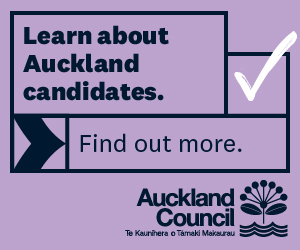
Auckland Council

Rates and revenue
The work of local government is funded mainly by property taxes in the local area, known as rates. This makes up around 60% of council expenditure, with the rest coming from user charges, investment income, regulatory fees and roading subsidies. Councils can also borrow money to spread the cost of large investments such as infrastructure over a longer period of time.

Rates and revenue
The work of local government is funded mainly by property taxes in the local area, known as rates. This makes up around 60% of council expenditure, with the rest coming from user charges, investment income, regulatory fees and roading subsidies. Councils can also borrow money to spread the cost of large investments such as infrastructure over a longer period of time.
Create a digital sliding scale that allows people to identify their rates spend priorities and get a potential discount for participating.
Review and rewind council's property valuation assessments that have just blown people's rates sky high.
Support in principal free public transport
Freeze general rates increase and stop any targeted rates until purpose is clearly defined to avoid problems similar to the bed tax.
Ensure all council investment must be supported by business cases that clearly demonstrate future benefits.
Ensure incapable senior management must be held accountable for non-delivery of outcomes through error or poor judgement.
Diversify revenue sources to alleviate the reliance on rates revenue.
Work with other councils to discharge the requirement of councils to charge ratepayers GST on rates.
Identify the strategic outcomes expected of Auckland Council's $1.9b investment in Auckland Airport to guide an investment strategy.
Do not raise rates above the rate of inflation.
Ensure that council debt is kept well below the Treasury Management Plan debt ceiling limit.
Look closely at the need to hold onto assets that maybe not be required now or in the future.
Keep below the council debt cap. Debt to revenue currently sits well below the 290% cap at 257%. Council has a strong AA credit rating.
Ensure council continues to source revenue from other areas that does not include rates. Currently council total revenue is only 38% rates.
Keep rate rises affordable while balancing the need to continue to invest in infrastructure and the services our community wants and needs.
Maintain excellent credit rating by working within our funding cap of 290%, seek public-private partnerships, reduce debt and build resilience.
Ensure measurable outcomes for all financial decisions. Honest management of Auckland Council finances, eg City Rail Link costs, improve financial accountability.
Keep rates as low as possible, acknowledge the huge financial risk of the City Rail Link. Ensure council services are maintained. Control spending.
Create a digital sliding scale that allows people to identify their rates spend priorities and get a potential discount for participating.
Review and rewind council's property valuation assessments that have just blown people's rates sky high.
Support in principal free public transport
Freeze general rates increase and stop any targeted rates until purpose is clearly defined to avoid problems similar to the bed tax.
Ensure all council investment must be supported by business cases that clearly demonstrate future benefits.
Ensure incapable senior management must be held accountable for non-delivery of outcomes through error or poor judgement.
Diversify revenue sources to alleviate the reliance on rates revenue.
Work with other councils to discharge the requirement of councils to charge ratepayers GST on rates.
Identify the strategic outcomes expected of Auckland Council's $1.9b investment in Auckland Airport to guide an investment strategy.
Do not raise rates above the rate of inflation.
Ensure that council debt is kept well below the Treasury Management Plan debt ceiling limit.
Look closely at the need to hold onto assets that maybe not be required now or in the future.
Keep below the council debt cap. Debt to revenue currently sits well below the 290% cap at 257%. Council has a strong AA credit rating.
Ensure council continues to source revenue from other areas that does not include rates. Currently council total revenue is only 38% rates.
Keep rate rises affordable while balancing the need to continue to invest in infrastructure and the services our community wants and needs.
Maintain excellent credit rating by working within our funding cap of 290%, seek public-private partnerships, reduce debt and build resilience.
Ensure measurable outcomes for all financial decisions. Honest management of Auckland Council finances, eg City Rail Link costs, improve financial accountability.
Keep rates as low as possible, acknowledge the huge financial risk of the City Rail Link. Ensure council services are maintained. Control spending.
Mayor
Compare the mayoral candidates in your area
Local council
Compare the candidates for your city or district council
Regional council
Compare the candidates for your regional council
Local board
Compare the candidates for your local or community board










